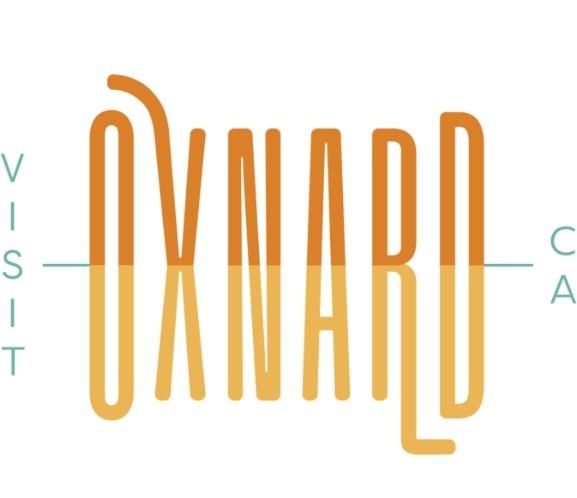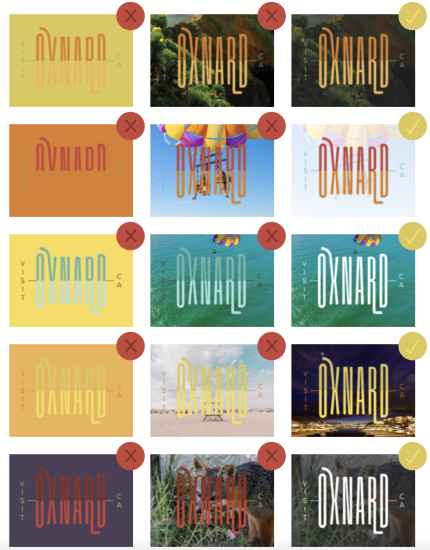Get the NEW 2026-27 Visitor Guide now!
The new 2026-20207 Visitor Guide is out now! Request your guide today.
More Info
BRAND GUIDELINES
Click to download all versions and colors of the logo: | Just looking for one file type? Click for a shortcut to: |
Our Logo
LOGO USAGE
The Visit Oxnard logo is personal to the city’s diverse attractions and laid-back, approachable culture. It uses friendly, fluid letters and a strong horizontal line to emulate the sun sinking into the ocean.
FULL COLOR
The Visit Oxnard logo has five full color versions. When in doubt, the yellow-orange logo should be used as the primary logo, however, there is flexibility depending on design and application as to when to use which logo. Being able to use all five interchangeably speaks to the versatile nature and diversity in experiences and culture found in Oxnard. The full color logo versions should be used as often as possible to build a strong brand identity.
 |
 |
BLACK Use this only if no other color version of the logo is an option, for example, screen printing. |
GRAYSCALE Use this logo when printing in black and white, for example, in a newspaper publication. |
FULL COLOR REVERSED
Use these versions when the logo is overlaid on a photo or background that can support the colors of “Oxnard”, but loses the colors, and therefore the visibility, of “VISIT” and “CA.” Please use discretion when doing this and default to the white reversed option when necessary.
 |  |
WHITE REVERSED If ever the logo is to be overlayed on a photo or background and the full color reversed option is unusable, the white version should be used. | MINIMUM SIZE The logo should always be clearly legible and should never have a height smaller than 0.45”. |

CLEAR SPACE
When placing the logo within artwork, please maintain a padding of clear space around the logo. The padding should be the length of the connecting lines that extend from the logo to “VISIT” and “CA”, and should be maintained all the way around the logo. That is to say that no image, or other text should extend into this padding area.
Our Logo
Background Usage
Sometimes the logo will be placed over images, visually complex backgrounds or colors that clash. Always make sure the logo can be easily seen. The full color logos are always preferred, but other options are available to help with legibility. The left column shows unacceptable logo usage when placed on a clashing color block, the middle column shows unacceptable logo usage over photography and the right column shows ways to correct. With the combination of colors in each logo, it is important to find the right balance for legibility. Either very dark backgrounds or very light backgrounds tend to lend themselves well to legibility for this group of logos.

The Type
TYPOGRAPHY
The brand typography must speak to the Oxnard personality and culture. Strong and legible, yet still approachable and laid back, Agenda is the brand’s primary typeface. Agenda has a wide variety of font styles, allowing for contrast between bold and thin, wide and condensed, regular and italic. When Agenda is not available for use in the digital space, Helvetica should be used.
As with the Visit Oxnard logo, consistent use of the brand typefaces reinforce the overall brand identity and personality.
Primary Typeface:
AGENDA
This typeface should be used as the primary typeface for all printed and digital content. In this way, Agenda’s simplicity works to its advantage, as it is very versatile and can be used for a diverse set of applications, while still jiving well with each personality of Oxnard.
Regular should be used for body copy, Regular all caps for headers and condensed italic for subheads.
Digital/E-mail Alternative:
HELVETICA
For digital correspondence and internal communication Helvetica may be used if Agenda is not available. It is available on most computers and can be consistent from computer to computer. This should NOT be used in printed collateral or external marketing materials.
All styles are acceptable (use Regular, sentence case for body copy).
The Color
COLOR PALETTE
The Oxnard color palette is fresh, warm and energizing. The shades of orange are vibrant and full of life, and point back to the city’s sunny and welcoming nature. While still lively, the shades of blue also bring in a cool and rejuvenating contrast.
Here are the color breakdowns for each production format. CMYK colors are used for any basic printed materials (flyers, brochures, documents, menus etc). RGB colors are used for any digital materials (social media, e-newsletters, website, TV advertisements, etc). The web safe colors are similar to RGB and are only used for digital materials. The six-digit code is an easy way to add specific colors when changing web design preferences.
© 2019 by Verdin Marketing. All Rights Reserved. This work is the property of Verdin Marketing and no part of it can be reproduced or transmitted in any form or by any information storage or retrieval system, without the written permission of Verdin Marketing, except where permitted by law.










